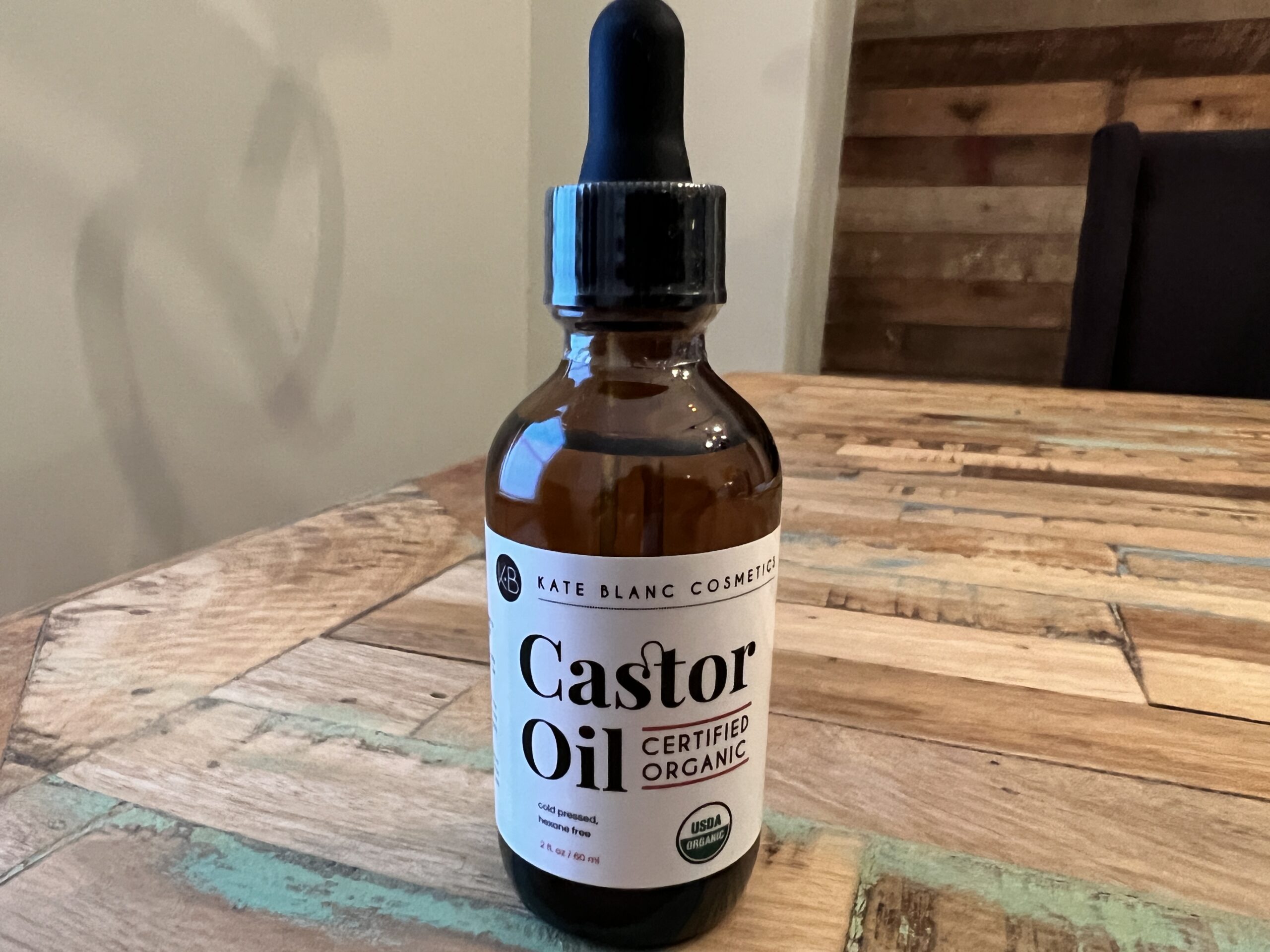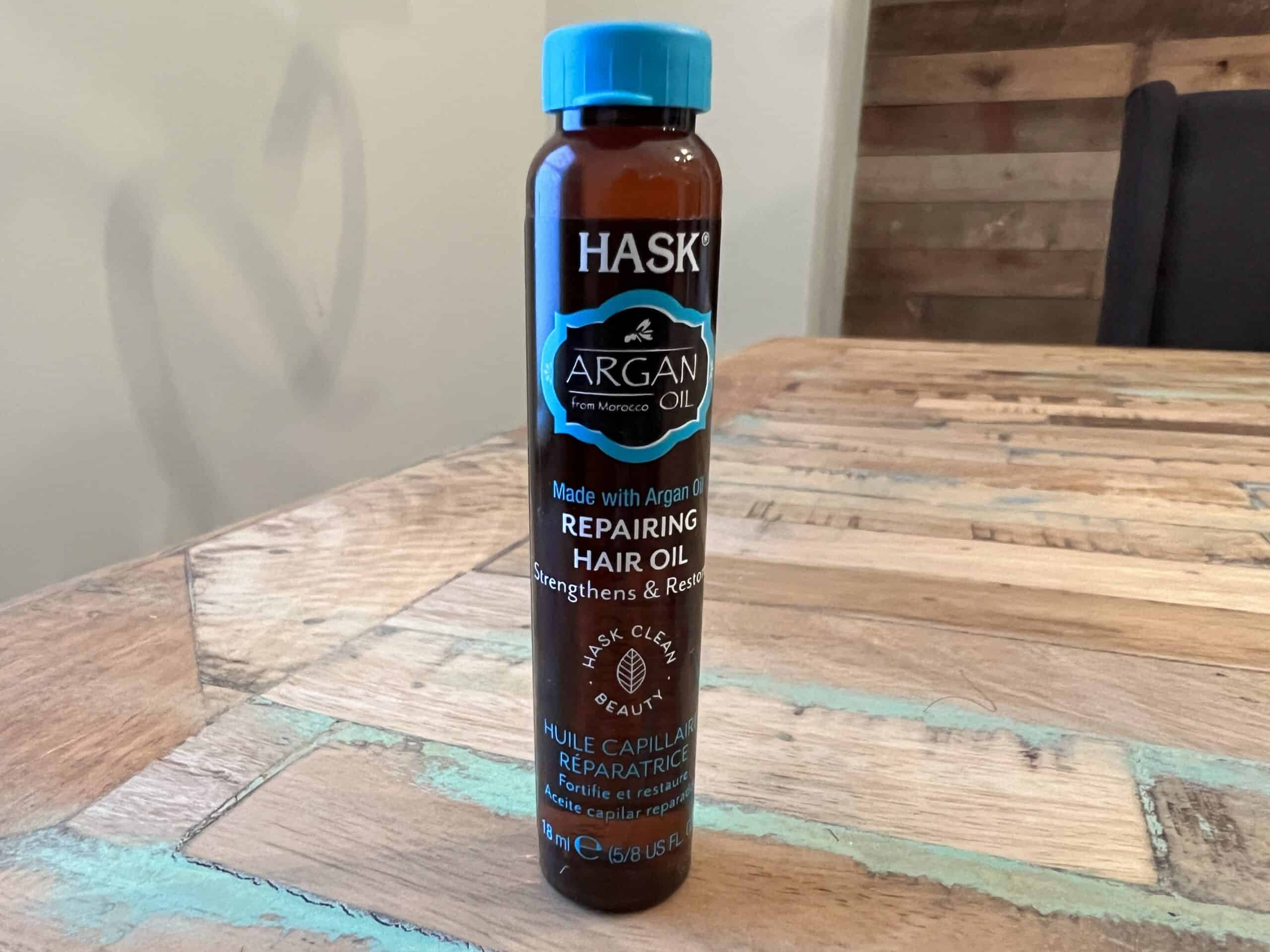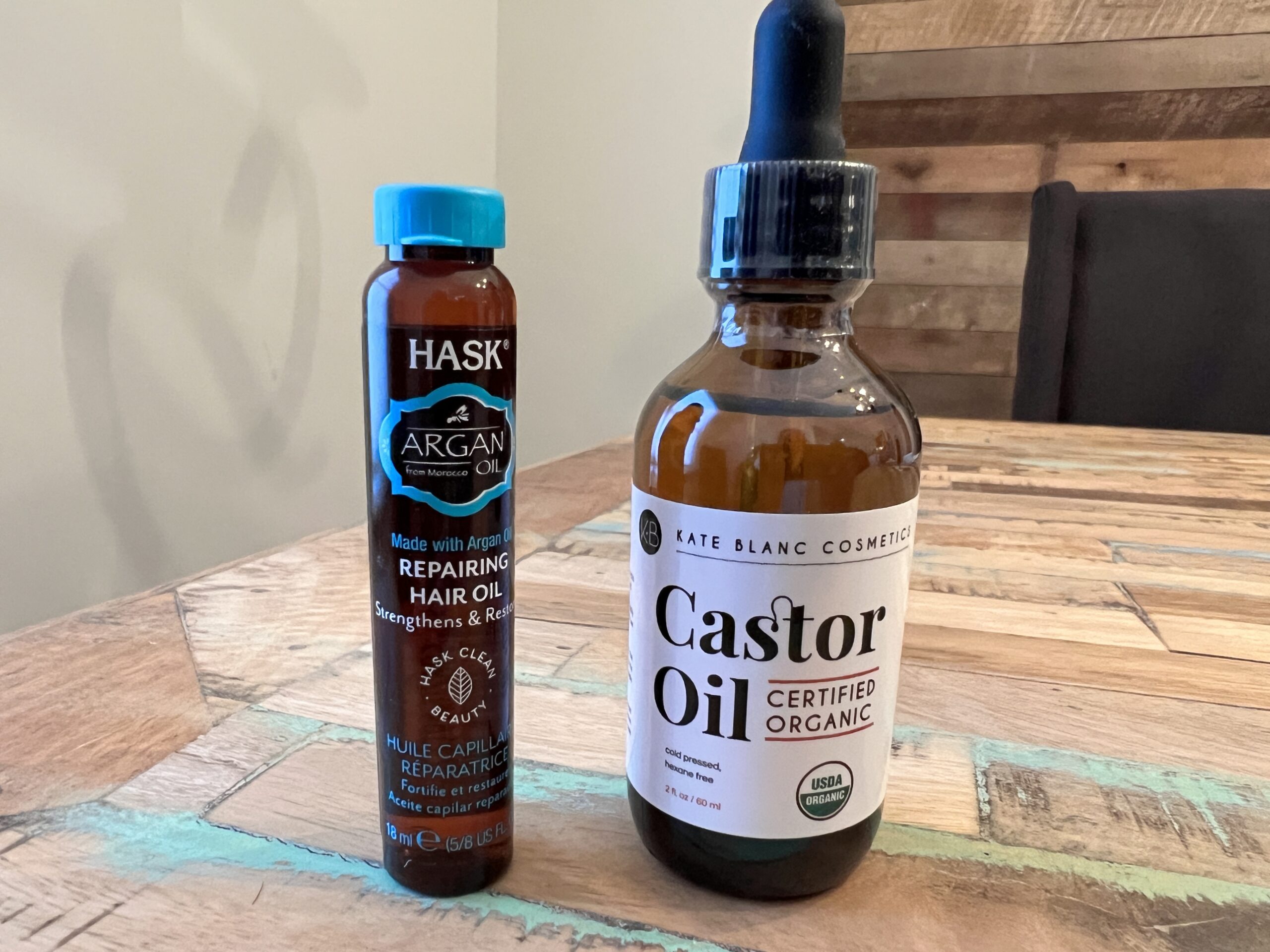
Castor oil and argan oil are two of the most commonly used hair oils in the natural hair community. They boast some amazing benefits for the hair, and countless people will agree.
However, one of the main dilemmas people come across when adding oils to their hair regimen is choosing the right oil. If you’re on the fence regarding whether castor oil or argan oil is best for your hair, this is the article for you.
In it, we’ll cover castor oil vs. argan oil for hair and illuminate all of the differences you should know about. Let’s get right into it!
Table of Contents
- 1 What Is Castor Oil?
- 2 What Is Argan Oil?
- 3 Castor Oil vs. Argan Oil for Hair: How They’re Different
- 4 Castor Oil vs. Argan Oil for Hair: How They’re Alike
- 5 Pros and Cons of Argan Oil for Hair
- 6 Pros and Cons of Castor Oil for Hair
- 7 Is Castor Oil or Argan Oil Better for Hair?
- 8 Which Oil Is Better Than Castor Oil for Hair?
- 9 Is It Okay to Mix Castor Oil and Argan Oil?
What Is Castor Oil?

For those who aren’t aware, castor oil is what you get when you press castor beans. It’s a vegetable oil that people have used for centuries to remedy skin dryness and reduce constipation. Egyptians also used the oil for cosmetic reasons.
The oil is thought to have originated in East Africa in 4000 B.C. And today, people use it for a variety of reasons, one of which is to promote healthy hair.
Pure castor oil is a very thick, sticky, heavy oil, and it’s very different from other oils you may have dealt with in the past. It’s yellowish in hue and is translucent.
One variation of castor oil, Jamaican Black Castor Oil, is darker in color, given that the castor beans are roasted prior to the oil extraction process.
What Is Argan Oil?

Argan oil is very widely considered to be liquid gold in the world of hair oil. It’s a plant oil that comes from argan tree seeds. Like castor oil, it’s by no means new. Countless groups of people have used it for centuries for a wide variety of things.
It was most notably used as a skin care agent to hydrate the skin and keep it healthy and as a tasty accompaniment to culinary dishes.
The oil is now regularly used on hair to improve its look, feel, and overall condition.
Argan oil is a lightweight oil, but it’s still substantial. The cosmetic variety of the oil has a golden yellow hue. But you may notice that the variety used for cooking is more of a golden brown, honey color.
The color of argan oil is a good indicator of its purity. If the oil doesn’t have much of a color, that means that it’s been heavily filtered or otherwise processed. There’s also a chance it could be fake.
It’s not uncommon for people to mix other oils with argan oil or pass other oils off as argan oil to make a buck.
Castor Oil vs. Argan Oil for Hair: How They’re Different
You’ve got the basics of both castor oil and argan oil down. Now, let’s get into the differences associated with these oils. They are far from the same, and knowing their nuances will help you decide with certainty which one could be the best for your hair.

Hair Penetration
When it comes to using oils in your regimen, it’s important to know how the oil reacts when you apply it to your hair. Sealing oils sit on top of the hair and play a protective role, sealing the moisture in and protecting against moisture loss.
Also, there are oils that penetrate the hair’s outer layers and work on the inside of the hair, imparting moisture and nutrients beneath the surface. Then, there are oils that can do either - they can seal in moisture, and they can penetrate the hair shaft. It all depends on how you use the oils.
Argan Oil Penetration Capabilities
Argan oil is a hybrid oil; it can penetrate and seal. When you apply this oil to your hair, it’ll penetrate the shaft, but some of it will stick around on the outside of your strands and form a protective seal to keep the goodness in.
Castor Oil Penetration Capabilities
On the other hand, castor oil is very much a sealing oil. It doesn’t penetrate the hair to any substantial degree. And this isn’t necessarily a bad thing. If you dampen and add moisturizing products to your hair first, you can lock all of that in with castor oil.

Weight
It’s always a good idea to consider the weight of an oil before adding it to your hair regimen. Why? Because if an oil is too heavy for your hair, it will weigh it down and make your hair flat and limp.
On the other hand, extremely lightweight oils may not be substantial enough to make a prolonged difference in your hair.
Argan Oil's Weight
Argan oil is known to be a lightweight oil that tends to be a good match for just about all hair types. If you have normal to coarse hair, you’ll be able to use it as needed without much worry about greasiness or hair flatness.
If you have fine or thin hair, though, this could quickly become an issue.
Castor Oil's Weight
The weightiness of castor oil is well-known and documented. It’s a heavy oil - much heavier than the majority of oils. Though this makes for some heavy-duty sealing and protection from moisture loss, it also means that it can easily weigh your hair down. Buildup is also a lingering concern with this oil.
Due to the oil’s weight, those with fine or thin hair should either use the oil sparingly or avoid it altogether. It’s much better suited to thick curly type 3 and 4 hair than it is to type 1 and 2 hair.

Nutrients and Their Benefits
As you might expect, the nutrients in a given oil have a lot to do with the benefits you’ll get from it.
Argan Oil Nutrients
Argan oil is very rich in vitamin E, which is an antioxidant that shields your hair and scalp from free radicals and the damage they inflict over time.
In addition to that, there’s a high concentration of fatty acids, which lubricate your strands and moisturize your scalp. Of course, these aren’t the only nutrients you’ll find in argan oil, but they are a few of the most important ones for hair health.
Castor Oil Nutrients
On the other side, castor oil also contains a high concentration of fatty acids (omega 6s and 9s). They make castor oil a fantastic hair smoother and moisturizer. The ricinoleic acid is thought to increase scalp blood flow, which can give your hair follicles a boost in function.
But in addition to that, the oil boasts proteins, minerals, and vitamin E. It also has antibacterial and antifungal properties. These nutrients mean that the oil can provide the following benefits to the hair:
- Healthier scalp with hair follicles that work appropriately.
- Better hair growth and length retention due to hair strengthening and moisturizing functions.
- Smooth, soft hair.
- Improved dandruff and itchy scalp issues.
And the list goes on and on.

Cost
According to Business Insider, argan oil is the most expensive edible oil in the entire world. As such, you’ll have to pay a pretty penny if you want to add argan oil to your regimen. Castor oil isn’t exactly cheap, but it’s definitely the most cost-effective option of the two.
Still, those who have found that argan oil is the best choice for them are happy to pay the steep price tag for it. Cost should definitely not be the only deciding factor to consider when choosing an oil to introduce to your hair regimen.
Buildup Potential
The first thing that you should understand is that both oils have the potential to build up on the hair and scalp. But castor oil is much more likely to cause this than argan oil is. Being that castor oil is sticky and thick, if you use it on a regular basis, overuse it, and fail to wash it all out, you may quickly experience buildup.
If your hair care routine is already conducive to buildup, you may want to pass on castor oil and go with argan oil or another oil. There are many oils that are lightweight and carry less of a buildup risk, including:
- Grapeseed oil
- Coconut oil
- Jojoba oil
- Marula oil
- Sweet almond oil
Alternatively, you can read this article to find out how to get castor oil out of your hair.

Castor Oil vs. Argan Oil for Hair: How They’re Alike
The differences between castor oil and argan oil are many. But the fact is that there are some similarities that you should also know about before making your decision. Let’s get into them below.
- Both oils are moisturizing. Both castor oil and argan oil contain loads of fatty acids. So, when you apply either of them to your hair, you’ll instantly feel a difference in your hair. You’ll see that your hair becomes smoother, behaves better during and after styling, and feels more moisturized.
- Both oils can seal to some extent. Though castor oil is solely a moisture sealer (and can keep your hair hydrated for several days at a time), argan oil can seal moisture into your hair as well. However, you should know that argan oil isn’t the best sealer - it’s not going to be as efficient as castor oil is for this purpose.
- Both oils can work on curls. If you have curly hair and want an oil to complement your hair regimen, you could go with either argan oil or castor oil. Though they have their differences, they both have benefits that someone with curly hair can benefit from, including moisture sealing, hydration, shine, etc.
Pros and Cons of Argan Oil for Hair
Argan oil may get a lot of praise, but it’s not at all perfect. In the below sections, we’ll give you a rundown of the pros and cons of this oil.
Pros
- Hydrates hair: Argan oil effectively softens and hydrates hair, making it a great solution for dry or brittle hair. It provides natural moisture that can be especially helpful in harsh weather conditions.
- Healthy shine: Adding a touch of argan oil can make your hair look shinier and more vibrant. It smooths out the hair follicles, giving your hair a sleek and polished appearance.
- Aids in styling: Whether you're dealing with frizz or unruly strands, argan oil can help in taming and managing hair, making styling easier. A fun tidbit is that it can be used as a heat protectant before blow-drying or straightening.
Cons
- Potential greasiness: If not used in moderation, argan oil can lead to a greasy appearance, particularly in fine or thin hair. It's important to find the right balance for your hair type.
- Expense: The cost of pure argan oil can be quite high, making it a less appealing option for those on a budget.
- Compatibility with hair types: Argan oil might not be suitable for all hair types. Those with oily hair may find that it exacerbates the issue, so careful consideration and a potential consultation with a hairstylist might be beneficial.
- Counterfeit oils: Due to the popularity and prestige associated with argan oil, there have been instances of counterfeit products infiltrating the market. These fake versions lack the beneficial properties of genuine argan oil. And you can't run away from this issue by buying organic argan oil. You've got to be very selective with the brands you use.
While argan oil offers several practical advantages, such as hydration and shine, it's not a one-size-fits-all solution.
Understanding your specific hair needs and being mindful of potential drawbacks, such as greasiness or incompatibility with your hair type, will help you make an informed decision.
Pros and Cons of Castor Oil for Hair
Like argan oil, castor oil comes with its own pros and cons. Keep reading for additional insight into whether castor oil might be the right oil for you and your hair.
Pros
- Promotes hair growth: Castor oil is rich in ricinoleic acid, which is believed to enhance blood circulation to the scalp and promote hair growth. This can stimulate hair follicles and encourage hair growth.
- Moisturizing: The fatty acids in castor oil help moisturize the hair and scalp, reducing dryness and brittleness and giving your hair a shiny appearance.
- Strengthens hair: Regular application might strengthen the hair, making it less prone to breakage. It also has the ability to thicken hair, which can be beneficial for those with thin or fine hair or those with hair loss.
Cons
- Allergic reactions: Some individuals may experience an allergic reaction to castor oil. Therefore, it's recommended to do a skin patch test first to ensure that you don't have an adverse reaction.
- Difficult washing it out: Castor oil's thickness can make it challenging to wash out of your hair completely. It might require multiple washes with a clarifying shampoo, which can potentially dry out your hair.
- Potential overuse problems: Using too much castor oil or leaving it on the hair for extended periods can lead to buildup, making hair greasy and heavy. It might also lead to scalp issues if not used in moderation.
While castor oil can be a wonderful natural treatment for various hair concerns, it's essential to use it judiciously and be mindful of your hair type and individual needs. If used appropriately, it can be a cost-effective and beneficial addition to your hair care routine.
Is Castor Oil or Argan Oil Better for Hair?
Neither castor oil nor argan oil is going to be better every time. Both oils have their high points and drawbacks, as we listed in the pros and cons. The one that you should opt for is the one that best addresses the hair issues you’re dealing with.
For example, if you’re looking to boost your hair growth from the source - your scalp - and you have thick, curly hair, castor oil may be the best bet for you. However, those with looser/white girl hair types can also use it.
Argan oil may be the best option for you if you want more of an all-purpose oil you can use for a variety of functions. Read this article to learn how to use argan oil. Remember that the only way to know for sure whether an oil is a good fit for you is to try it out.
So, we urge you to experiment with both oils, in addition to others, to see which meshes best with your hair chemistry and routine.
Which Oil Is Better Than Castor Oil for Hair?
There is no oil that’s going to be better than castor oil in every case. The best hair routines are forged in a holistic way, and that’s because everyone’s hair and scalp are different. But there are a few natural oils that are similar to castor oil and might give you similar or better results than castor oil can, and they include:
- Avocado oil - For those who need an oil that is medium to heavyweight and works wonders on textured hair.
- Olive oil - For those looking for a middle-of-the-road oil with a laundry list of benefits.
- Jojoba oil - For those who want a sealing oil that’s not as heavy as castor oil.
*This is not an exhaustive list of oils that you can try if you decide that castor oil isn’t for you. They work great as a starting point.
Is It Okay to Mix Castor Oil and Argan Oil?
You can mix castor oil and argan oil together to get the benefits of both oils. For some, leaving any benefits on the table isn’t an option.
What’s more, is that you might find that argan oil isn’t rich enough for you or that castor oil is too viscous for you. In either case, combining the oils could be exactly what you need to get the results you’re looking for.
You may decide to mix half castor oil and half argan oil. Or you may find that a different mixing ratio may work out better - experiment with several to find out what works best for you.
- Which Oil Is Good for Thick Hair Growth?
- Oil for Low Porosity Hair
- How to Use Castor Oil for Hair Growth and Thickness
So, there you have it - everything you need to know about the differences between castor oil and argan oil. We hope that you found all of the information you were looking for, and we wish you the best with your hair.




